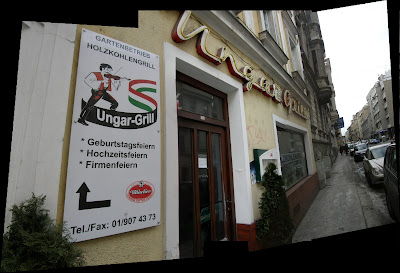S nyögte Mátyás bús hadát
Bécsnek büszke vára.
Még vagyunk néhányan.
Errefelé a szerb a legnagyobb kisebbség.
.jpg) |
| Ungar-Grill Megállt az idő |
Due to the industrialization and migration from other parts of the Empire, the population of Vienna increased sharply during its time as the capital of Austria-Hungary (1867–1918). In 1910, Vienna had more than two million inhabitants, and was one of the six largest cities in the world.[citation needed] At the turn of the century, Vienna (Czech Vídeň, Hungarian Bécs) was the city with the second-largest Czech population in the world (after Prague). At the height of the migration, about one-third of the Viennese population was of Slavic or Hungarian origin. After World War I, many Czechs and Hungarians returned to their ancestral countries, resulting in a decline in the Viennese population.
In 1923, there were 201,513 Jews living in Vienna, which had become the third-largest Jewish community in Europe. 65,000 Jewish people were deported and killed in concentration camps by Nazi forces, approximately 130,000 fled.
By 2001, 16% of people living in Austria had nationalities other than Austrian, nearly half of whom were from former Yugoslavia, primarily Serbs; the next most numerous nationalities in Vienna were Turks (39,000; 2.5%), Poles (13,600; 0.9%) and Germans (12,700; 0.8%). (wiki)
| bérlő: Stefan Giczi |
| piros-fehér-piros piros-fehér-zöld forever united |
Nincsenek megjegyzések:
Megjegyzés küldése